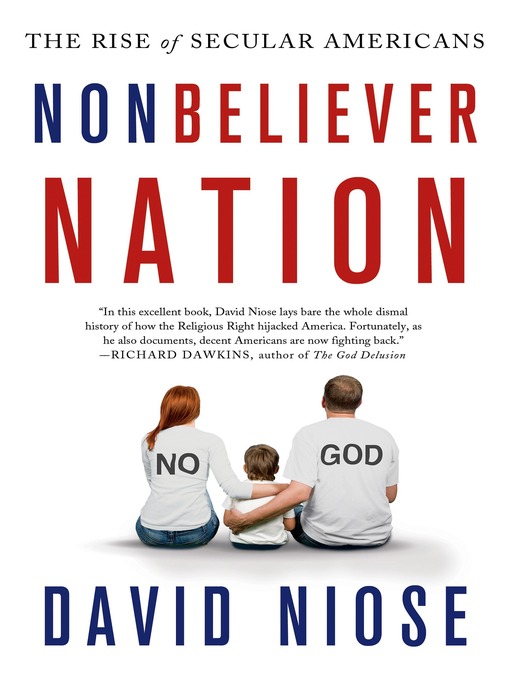
Nonbeliever Nation
The Rise of Secular Americans
کتاب های مرتبط
- اطلاعات
- نقد و بررسی
- دیدگاه کاربران
نقد و بررسی

April 2, 2012
America’s secular demographic—those who report “none” when asked for religious identity—is growing faster than any other religious identification, especially among 18-to-29-year-olds. A lawyer and president of the American Humanist Association, Niose explores secularism’s extraordinary rise and shows how it offers hope for more rational, inquiry-based public policy and discussion. Examining the roots of secularism, he notes that the U.S. has never been a Christian nation, though modern secular activism only emerged in the last 10 years in opposition to the Religious Right, whose rise, over the past three decades, remained virtually unchecked. Careful to note that it’s not Christianity that’s problematic, but the alliance of Christian and political conservatism that has attacked climate science, evolution, contraception, and the separation of church and state, he highlights the ways secularism is gaining traction against the fundamentalist agenda through billboards, litigation, and identity politics. Optimistic about the increase in secular activity—the growth of college and high school groups, humanist chaplaincies, secularity as a course of study—he finds that secularity offers the best hope for the future, and he makes a passionately strong, though at times repetitive, case for why secularism is so beneficial for the U.S.

July 1, 2012
American Humanist Association president Niose provides a thorough examination of modern secular movements in America, while lumping believers together in disdain. From the beginning of the book, the author pits "Secular Americans" (identified as atheists, agnostics, humanists and those who are generally nonreligious) against "the Religious Right," an amorphous group who appear throughout as the source of most of America's ills over the past 30 years. Niose points out that while nonbelievers have always existed in American society, only recently have they begun to act to institute changes in public policy, mainly as a direct reaction to the religious right. Looking back to America's founding, Niose argues that "a fair assessment of history would reveal that the structure of American government was not intended to be either proreligion or antireligion, but simply neutral on religion." Where religion did become involved in early American public life, he writes, it was harmful or even disastrous (e.g., the Salem witch trials). Niose echoes the argument of other modern nonbelievers that religion is usually immoral in its effects on society, whereas secularism is untainted by any immoral past. This sets the stage for the author's extended assault on the religious right, which is characterized as anti-intellectual, hypocritical and belligerent. The most useful part of the book is Niose's survey of the rise of organized secularism. He discusses important figures in the secular movement, landmark Supreme Court cases and the creation and growth of national organizations. Readers hoping to better understand the background of today's secular movement will find solid material, and secular activists will applaud the author's zeal for the cause. The vast majority of religious Americans, however, will not see themselves in this book at all. While it may be understandable that Niose attacks the most radical of the faithful, it is less understandable that he ignores the existence of the vast majority of people of faith. A loaded attack on religion redeemed by a useful examination of secularism.
COPYRIGHT(2012) Kirkus Reviews, ALL RIGHTS RESERVED.

May 15, 2012
Covering a wide range of territory in a reasonably condensed space, attorney Niose (president, American Humanist Assoc.) looks at the culture wars from the perspective of secular America. While confronting numerous commonly held misconceptions by believers about secularism (e.g., the religious Right implying that religious faith is part of patriotism), Niose admirably refrains from antireligious hostility, striving for equality rather than proving the superiority of his perspective. Much of the book is devoted to the Constitution, the role of the religious Right in American political and social life, and the recent emergence of a more organized secular movement. However, Niose's most significant contribution is in laying out a new legal strategy that utilizes the Equal Protection Clause rather than the Establishment Clause of the Constitution to underline the rights of secular Americans in not practicing religion. VERDICT This is a calm, informative, and positive portrait of the rapidly growing secular segment of the American population. Highly recommended for politically oriented readers of all religious persuasions--although readers from the Left are most likely to read it--and those interested in accessible discussions of constitutional issues.--Brian T. Sullivan, Alfred Univ. Lib., NY
Copyright 2012 Library Journal, LLC Used with permission.

























دیدگاه کاربران